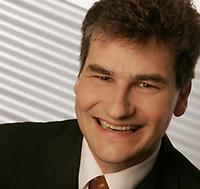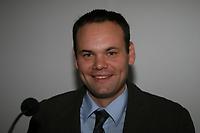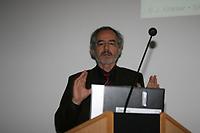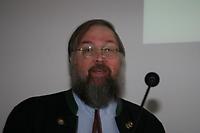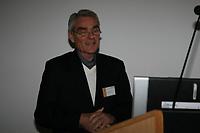Track 2: eLearning
#
Chairperson A. Holzinger
Ebner Martin: e-Learning for Higher Education
#
The presentation gives an overview of current e-Learning activities at Graz University of Technology. Practical examples are presented as well as new didactical concepts. The use of Web 2.0 technologies in Higher Education and currently research work will point out the future of e-Learning.About Martin Ebner
Nach Assistentenstellen am Institut für Betonbau und Institut für Bauinformatik der TU Graz ist er seit Sept. 2006 Leiter der Arbeitsgruppe "Vernetztes Lernen" am Zentralen Informatikdienst der TU Graz.
Krämer Bernd: Exposure and Support of Latent Social Networks Among Learning Object Repository Users
#
Although immense efforts have been invested in the construction of learning object repositories, the degree of reuse of learning resources maintained in such repositories is still disappointingly low. Various reasons have been identified as potential causes including: psychological barriers to make explicit use of foreign learning resources in higher education, concerns about the quality and composability of resources from disparate providers, usability and functional deficits of repositories, and disorientation of repository users. Inspired by the increasing acceptance of social software, we carried out an empirical study with the objective to address the disorientation issue by looking at recurring patterns of use and discovering latent communities of practice for the retrieval of reusable learning resources. Subject of investigation was LON- CAPA, a cross-institutional learning content management and assessment system used for nearly a decade now by currently more than 70 institutions, mainly based in the US. First we analyzed a plethora of log data collected over a period of three years. We revealed several kinds of connectivities among LON-CAPA users that gave rise to a few hypotheses about how these latent relationships may influence people’s selection of learning resources. These hypotheses were then verified both by collecting feedback from LON-CAPA operators and users. The latter had to answer a questionnaire addressing individual retrieval and evaluation strategies, including trust issues. In a third step we designed and implemented a few services that aim to enforce reuse behavior. They were combined with a social networking software that supports closed communities of practice. The enhanced functionality is currently used and validated by a subset of LON-CAPA users.
About Bernd Krämer
He was a senior scientist of GMD, Sankt Augustin, Germany, an adjunct professor at the Naval Postgraduate School, Monterey, California, a visiting professor at the Queensland University of Technology in Brisbane, Australia, at McGill University, Montreal, and at the University of California, Berkeley, and on the School of Computer Science and Software Engineering of Monash Unversity in Melbourne.
His research interests include Web-based hypermedia systems, distributed systems management and engineering, safety-related software, and formal methods. He has published extensively on these topics. He is the editor-in-chief of the Journal of Integrated Design & Process Science and he is on the editorial boards of the Journal of Software Engineering and Knowledge Engineering and of Springer's new journal "Innovations in Systems & Software Engineering".
Maguire Gerald Q."Chip" Jr.: Applying computer science to solve problems: Step 1: Picking problems OR Being a contrarian - don't search under the lamppost
#
My standard advice to graduate students is:
The best problems to pick are:
(1) those that everyone says are _trivial_ - because some of them are _not_
or
(2) those that everyone says are _impossible_ - because some of them are _not_.
Find real problems - don't invent them. Being driven by real problems has lots of advantages:
(0) you can have a lot of fund
(1) you get to learn (a lot) of new things
(2) colleagues who will keep asking _why_? and _why_not_?
(3) you have to explain what you are doing to someone else who does not have the same approach or background as you do - both of you will learn in the process
(4) you can have an appreciative audience - if you can really improve the way that your collaborators can get their job done - so aim for order of magnitude effects
How do you know when you are successful:
(1) when you bankrupt the companies in the existing industry
(2) when you change the existing industry
(3) when others utilize/rip off your idea(s) and make their fortune or career with it/them
(4) when you make high level managers/administrators/... uncomfortable(or upset) because they see that you are destroying their business, organization, plans, etc.
(5) when the people who said "your are crazy" later say "but you were right"
(6) when you see someone smile because you just made their job a whole lot easier
The talk will be illustrated with examples from medical imaging, typesetting, mobile computing,data communications, ...
About Gerald Q. "Chip" Maguire
Ottmann Thomas: Of men and machines- More than 10 years of experience with electures at universities
#
Over the last decade the Computer Science Department of the University of Freiburg has gained a lot of experience with the production and use of electures poduced from live recordings. We review the origin of the tools used for presentation recording and emphasise the consquences of the object-based approach in contrast to screen grabbing. By extensive user studies and logfile analyses we revealed the preferences of users with respect to different formats of electures, navigational patterns, and ways of utilization. Though there are currently a number of different options for recording live presentations available, there are still a number of core features not solved satisfactorially. Therefore, we finally describe new developments possibly leadung to better systems.
About Thomas Ottmann
From 1976 until 1987 he was Professor at the Institut AIFB in Karlsruhe. In 1987 he became the first professor for Computer Scince at the University of Freiburg. There, he was significantly involved in the establishment of a new Technical Faculty. He was visiting professor at the universities of Waterloo, Canada, ETH Zürich, Switzerland, Harris Guestprofessor at Dartmouth College, New Hampshire, USA, and visiting professor at the University of Western Australia, Perth.
He served as Secretary of the European Association for Theoretical Computer Science, as elected referee for the German Science Foundation (DFG), and coordinated special research research programmes in Algorithms and Data Structures. He served as member of the Scientific Advisory Committee of the State of Lower Saxony. He is member of the steering committee of the Swiss Virtual Campus, member of the Advisory Board of the L3S, Hannover, and member of the Evaluation Panels of the Universities Tampere and Oulu, Finland. Since 2006 he is head of the Technical Committe of the Accreditation Agency ASIIN specialised in accrediting degree programs in Engineering, Informatics, the Natural Sciences, and Mathematics. Since October 2006 he is GI-Fellow.
He authored four and edited seven books and published more than 150 scientific papers. His researchn interests include Algorithms and Data Structures, Computational Geometry, Multimedia Systems, and eLearning.
Continue to Track 3
